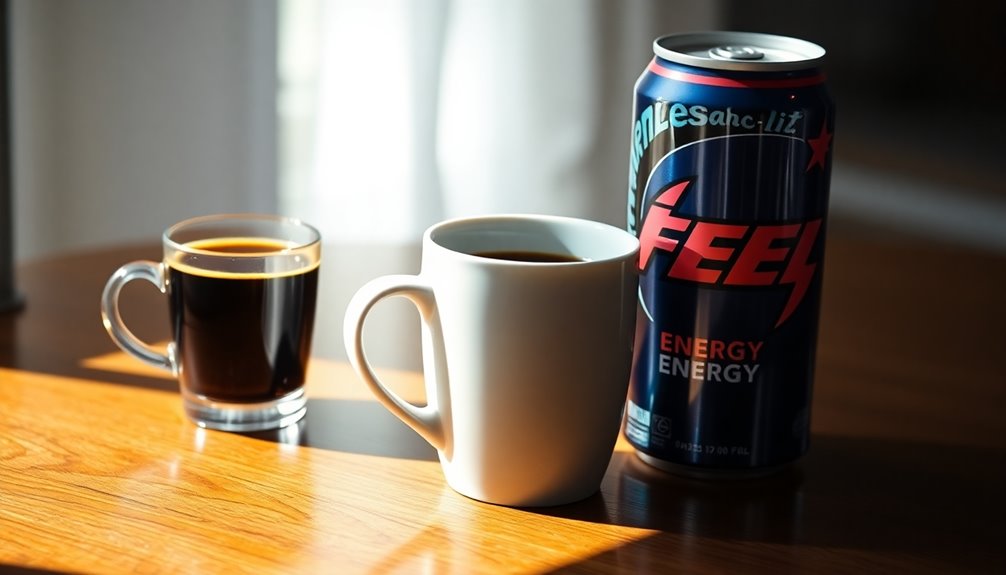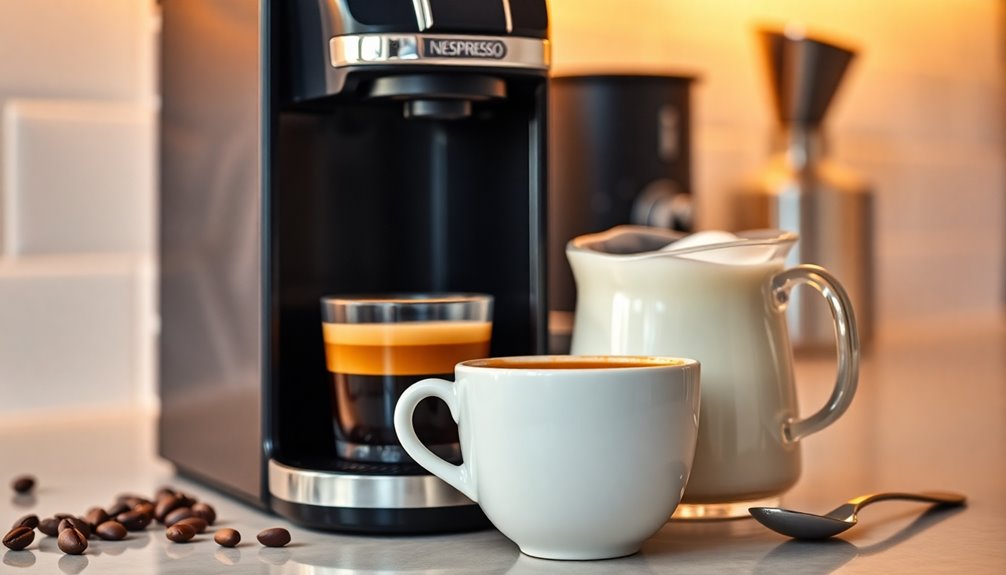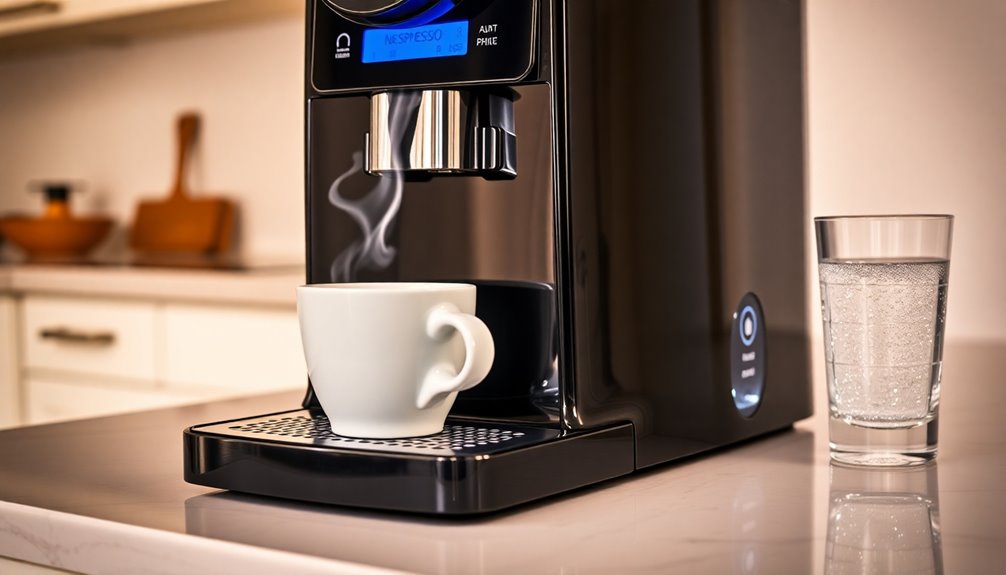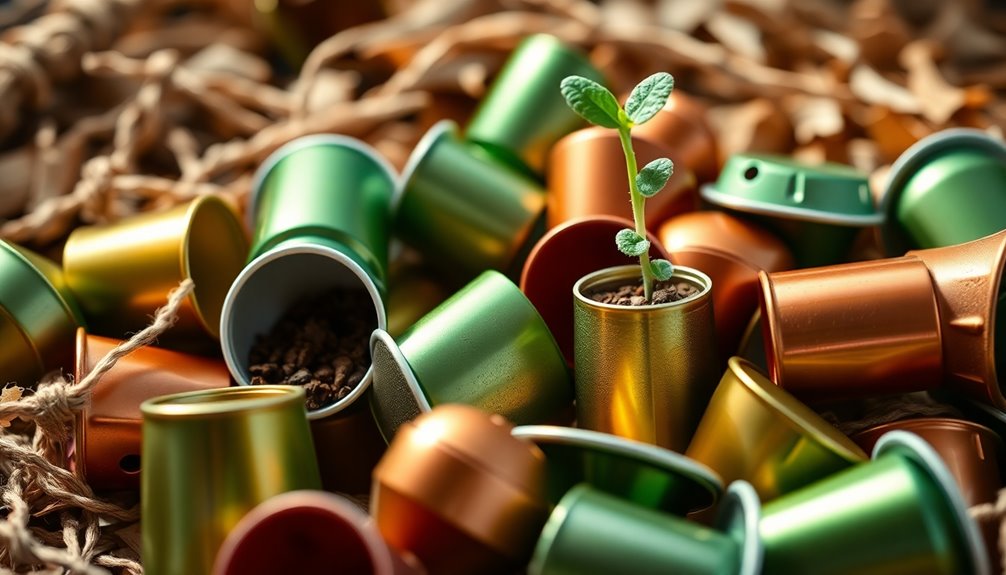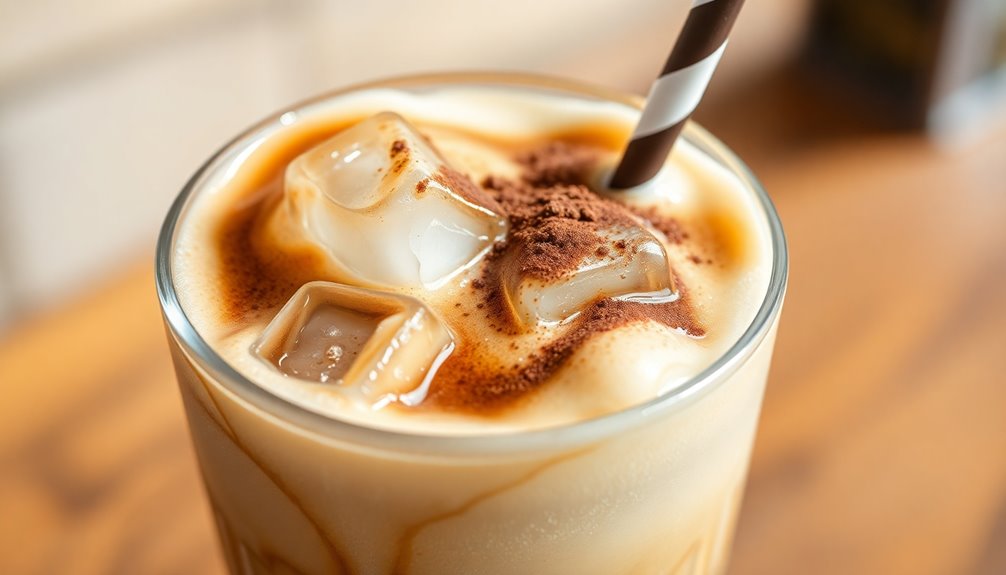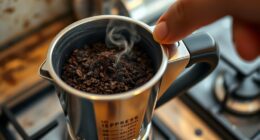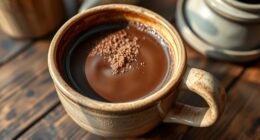When you compare caffeine content, traditional coffee leads with about 95-120 mg per 8 oz cup, depending on the brewing method. Nespresso capsules offer roughly 60 mg each, making them less potent but highly convenient. Energy drinks like Monster or Red Bull deliver around 110-120 mg in a 12 oz serving, giving you that quick energy kick. While Nespresso is great for ease, if you need a serious caffeine boost, traditional coffee and energy drinks might be better choices. If you’re curious about how these options impact your health, there’s more to explore. Additionally, for those seeking caffeine on-the-go, the caffeine content in McDonald’s Americano is approximately 140 mg per 16 oz serving, which can make it a strong contender for a quick caffeine fix. It’s important to consider not just caffeine levels but also how your body reacts to different sources, as some options may lead to jitters or crashes. Ultimately, your choice may depend on your preference for taste, convenience, and how much of a boost you need to power through your day.
Key Takeaways
- Nespresso capsules contain approximately 60 mg of caffeine per serving, which is lower than traditional brewed coffee.
- Traditional coffee averages 95-120 mg caffeine per 8 oz, depending on brewing method and bean type.
- Energy drinks like Monster and Red Bull typically contain 110-120 mg of caffeine in a 12 oz serving.
- Nespresso offers a high concentration of caffeine per fluid ounce, about 44.4 mg, making it potent in smaller volumes.
- The FDA recommends a maximum caffeine intake of 400 mg for adults to avoid negative health effects.
Caffeine Sources Overview

When it comes to caffeine sources, you'll find a variety of options that cater to different preferences and lifestyles.
Traditional coffee remains a popular choice, offering approximately 95-120 mg of caffeine per 8 oz cup, depending on how it's brewed.
If you're looking for convenience, Nespresso capsules provide about 60 mg of caffeine per capsule, with some specialty options containing even more.
For those needing a quick energy boost, energy drinks like Monster and Red Bull deliver around 110-120 mg of caffeine in a 12 oz serving.
While Nespresso is great for on-the-go enjoyment, traditional coffee and energy drinks generally offer higher caffeine levels, allowing you to choose the source that best fits your needs.
Caffeine Content in Nespresso

When you pop in a Nespresso capsule, you're getting about 60 mg of caffeine per serving, which is quite a bit less than the average 95 mg in a standard cup of brewed coffee.
However, Nespresso packs a punch with a higher concentration of caffeine per fluid ounce compared to traditional drip coffee.
This means that depending on your choice of capsules, you can customize your caffeine experience while enjoying a rich coffee flavor.
Nespresso Caffeine Levels
Nespresso capsules pack a punch when it comes to caffeine content, making them a popular choice for coffee lovers seeking a quick energy boost. Each standard Nespresso capsule contains around 60 mg of caffeine, translating to roughly 44.4 mg per fluid ounce.
When you brew a typical Nespresso serving size of 1.35 ounces as espresso, you get about 63 mg of caffeine, comparable to traditional espresso shots.
Keep in mind that caffeine levels can vary based on the specific blend, with some capsules packing even more caffeine.
The high-pressure brewing method used by Nespresso optimizes caffeine extraction, providing a concentrated caffeine hit in a smaller volume compared to traditional coffee, which averages 95 mg per 8-ounce cup.
Comparison With Other Coffees
While Nespresso offers a concentrated caffeine kick, it's essential to compare it with other coffee options to understand your choices better.
A standard Nespresso serving typically delivers around 77 mg of caffeine, similar to a single shot of espresso. However, when you look at an average cup of traditional drip coffee, you'll find it contains about 95 mg of caffeine in an 8 oz serving. This means traditional coffee often provides higher total caffeine per serving.
Nespresso's caffeine content can vary slightly based on the blend, but on a per-ounce basis, Nespresso's caffeine concentration is about 44.4 mg.
Caffeine Content in Traditional Coffee

When you brew traditional coffee, the method you choose can really affect the caffeine content.
Depending on the type of beans and the brewing time, your cup might pack anywhere from 70 to 140 mg of caffeine per 12 ounces.
Brewing Methods Impact Caffeine
The method you choose to brew your coffee can considerably affect its caffeine content.
For example, a typical cup of drip coffee contains around 95 mg of caffeine per 8 oz, but this can fluctuate based on the brewing methods and factors like grind size and water temperature.
An espresso shot, on the other hand, extracts caffeine more efficiently, delivering about 63 mg per 1 oz shot.
If you prefer cold brew, you'll find it often packs a caffeine punch due to its extended steeping time, which can last 12-24 hours.
Ultimately, understanding how brewing methods impact caffeine levels helps you tailor your coffee experience to suit your needs.
Caffeine Levels by Type
Caffeine enthusiasts often turn to traditional coffee for a reliable energy boost. An average 8-ounce cup of brewed coffee contains about 95 mg of caffeine, making it a popular choice for many.
While espresso has more caffeine per ounce, with roughly 63 mg, a double shot can total around 126 mg. However, brewed coffee generally offers a longer-lasting caffeine effect due to its larger serving size, which allows for slower absorption.
Some stronger brews can exceed 200 mg per 8-ounce serving, especially specialty drinks made with dark roasts. This variation in caffeine levels means you can choose coffee that suits your needs while enjoying its potential health benefits, including improved mental alertness and enhanced physical performance.
Serving Size Considerations
Serving size plays an essential role in determining the caffeine content in traditional coffee.
For instance, a standard 8-ounce cup of drip coffee typically contains about 95 mg of caffeine from the coffee. If you opt for a larger 12-ounce cup, you might find between 120 to 140 mg of caffeine, depending on the strength and brewing time.
In contrast, a single shot of espresso packs around 63 mg of caffeine in just 1 ounce, showing how concentrated it is.
Different brewing methods, like French press or AeroPress, can also affect how much caffeine you get.
For example, AeroPress coffee averages about 110 mg in a 6-ounce serving, illustrating the impact of preparation on caffeine content.
Caffeine Content in Energy Drinks

While you might expect energy drinks to pack a punch, their caffeine content often mirrors that of a standard cup of coffee. A typical 250 ml energy drink contains about 80 mg of caffeine, similar to what you'd find in your morning brew.
Brands like Monster and Rockstar can ramp it up to around 120 mg per 12 oz serving, while Red Bull offers about 110.7 mg. Some energy drinks even hit the high notes at 300 mg for extra-strength options.
Unlike coffee, where you might sip shots of espresso for a gradual kick, energy drinks can deliver a quick surge of energy, largely due to added stimulants and sugars.
Health Implications of Caffeine

Although many enjoy their daily caffeine fix, it's important to understand the health implications tied to its consumption.
While caffeine has potential benefits, it can also lead to negative effects. Here are some key points to examine:
- Daily Intake Limits: The FDA recommends a maximum of 400 mg of caffeine for most adults to avoid adverse health effects.
- Sleep Disruption: Caffeine can negatively impact sleep quality, especially if consumed later in the day.
- Individual Tolerance: Tolerance varies; some coffee drinkers may handle high amounts without issues, while others might experience jitters or increased heart rate with smaller doses.
Being aware of these factors can help you make informed choices about your caffeine consumption and its health implications.
Comparing Caffeine Levels

Understanding the caffeine content in your favorite beverages can help you make better choices.
When you compare Nespresso, traditional coffee, and energy drinks, you'll notice distinct differences. A standard Nespresso capsule delivers about 60 mg of caffeine, while an 8 oz cup of drip coffee typically has around 95 mg. Energy drinks, like Monster and Red Bull, can contain up to 120 mg per 12 oz, sometimes surpassing coffee's average.
Nespresso stands out with a caffeine concentration of 44.4 mg per fluid ounce, whereas drip coffee offers about 12 mg per fluid ounce. Although Nespresso provides a concentrated boost, traditional coffee usually delivers a higher total caffeine amount per serving, making it essential to choose according to your caffeine needs.
Frequently Asked Questions
Does Nespresso Have More Caffeine Than Regular Coffee?
Nespresso doesn't have more caffeine than regular coffee.
While a standard Nespresso capsule offers about 60 mg of caffeine, an average 8 oz cup of drip coffee contains around 95 mg.
Even though Nespresso's brewing method extracts caffeine effectively, the smaller serving sizes often lead to lower total caffeine.
If you're looking for a stronger caffeine kick, sticking with traditional coffee is your best bet.
How Much Caffeine Is in Energy Drinks Vs Coffee?
When you're comparing caffeine in energy drinks versus coffee, you'll find some interesting differences.
A typical 8-ounce cup of coffee has about 95 mg of caffeine, while an average energy drink contains around 80 mg in a similar serving size.
However, some energy drinks can pack up to 120 mg per 12 ounces, which can give you a stronger jolt than your usual coffee.
Always consider how your body reacts to each option!
How Much Caffeine Is in Nespresso Vertuo Vs Original Coffee?
When it comes to caffeine, you're in for a treat!
Nespresso Vertuo capsules pack about 70-150 mg of caffeine per serving, depending on the blend and size.
On the flip side, Original capsules provide around 55-65 mg per shot.
If you're looking for a stronger kick, you might find Vertuo more appealing.
Just remember, the caffeine content varies, so check the specific blend to find your perfect fit!
Does Espresso Have More Caffeine Than an Energy Drink?
When you compare espresso to energy drinks, it really depends on the serving size.
A double shot of espresso packs about 126 mg of caffeine, which can be more than some energy drinks.
However, many energy drinks contain around 110-120 mg per 12 oz serving, so they can rival or even exceed espresso's caffeine content.
Ultimately, if you're looking for a quick boost, espresso might give you a stronger hit in a smaller volume.
Conclusion
In the battle of caffeine, whether you're sipping on a Nespresso, brewing traditional coffee, or cracking open an energy drink, it's clear each has its own kick. Remember, moderation's key—after all, you don't want to be bouncing off the walls like you just chugged a gallon of soda at a roller rink! So, choose your brew wisely and enjoy that caffeine buzz without overdoing it. Your body will thank you, and you'll keep your cool!
